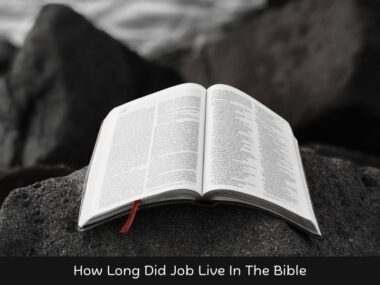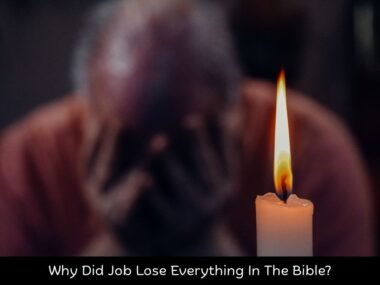Job’s wife is a mysterious and often misunderstood figure in the Bible. Though her role is brief, her presence in the Book of Job raises important questions about suffering, support, and faith. She appears at a pivotal moment—after Job has lost his children, wealth, and health. Her one line, often quoted and critiqued, has sparked centuries of debate. But her role shouldn’t be dismissed. She was not just a character to challenge Job’s integrity; she was also a witness to immense shared grief. To understand her significance, we must consider her place not only in Job’s story—but in human suffering itself.
Her Presence in the Story of Job
Job’s wife appears only once in the biblical narrative, in Job 2:9, where she asks, “Do you still hold fast to your integrity? Curse God and die.” While this single line is often cited, it’s important to recognize her presence amidst devastation. She had just lost her children, watched her husband become physically unrecognizable, and lived through a collapse of everything familiar. Her appearance in the story is short but emotionally charged, providing a voice to the unspoken grief and despair many might feel in her position. Her presence, though limited, reflects the unfiltered anguish of extreme human suffering.
Analysis of Her Words and Actions
Job’s wife’s statement, “Curse God and die,” has often been interpreted as callous or faithless. Yet, a deeper analysis reveals a woman overcome with grief, watching her beloved husband suffer without relief. Her words may not be theological instruction but an expression of raw, emotional trauma. Some scholars suggest she wasn’t urging blasphemy but rather lamenting Job’s clinging to righteousness in the face of relentless agony. Her statement could reflect despair rather than rebellion. Inaction or silence might suggest apathy, but her outburst indicates deep engagement and pain. Her reaction may mirror the human tendency to cry out during intense loss.
Portrayal of Job’s Wife: Villain or Victim?
Over time, Job’s wife has often been painted as a villain—a faithless woman tempting her husband to betray God. Yet, such a portrayal may be unjust. In truth, she could be seen as a victim of tragedy herself, coping with unbearable loss and witnessing her husband’s agony. Unlike Job, she does not receive divine commentary or restoration. She is neither named nor offered closure. The assumption of villainy may reflect interpretative bias rooted in cultural and gender norms rather than biblical fact. Viewed through a more empathetic lens, Job’s wife emerges not as an antagonist, but as a fellow sufferer.
Traditional Interpretations
Traditional commentaries, especially from early church fathers and rabbinic literature, often view Job’s wife negatively. Augustine and Calvin interpreted her words as temptation, likening her to Eve—used by Satan to undermine Job’s faith. Some Jewish texts suggest Satan used her as a vessel to test Job. These views reflect theological frameworks that equated faith with unwavering endurance, often discounting emotional responses like hers. Within these traditions, her grief is overshadowed by her perceived failure to support Job. Yet, tradition also varies. Some rabbis saw her as a tragic figure, mourning the loss of her children and reacting as any mother might.
Modern Perspectives
Modern biblical scholars and theologians have re-evaluated Job’s wife with more compassion. Feminist theology, in particular, highlights how her brief speech reflects a profound, human reaction to unimaginable suffering. Contemporary interpreters argue that she symbolizes those who voice what others silently endure. Some even see her as protective—wishing death as a mercy for Job’s suffering. Her humanity, rather than her supposed lack of faith, becomes the focal point. This shift aligns with broader efforts in biblical scholarship to include marginalized voices and reevaluate characters historically dismissed due to gender, brevity, or nonconformity to patriarchal narratives.
Historical Context of Job’s Wife
To understand Job’s wife, we must consider the time in which she supposedly lived. The Book of Job is set in an ancient patriarchal culture where a woman’s identity was closely tied to her husband and children. The loss of all ten of her children would have been not only emotionally devastating but socially and economically catastrophic. She had no legal recourse or protection, and the collapse of her household meant a total loss of security. Her voice—anguished and abrupt—must be read within this context. Her words, then, become a cry against societal powerlessness and emotional isolation.
Cultural Norms of the Time
In the ancient Near Eastern world, women were typically excluded from theological debates and public discourse. They were expected to support their husbands quietly, bear children, and manage domestic affairs. Public grief or emotional expression could be seen as weakness, particularly from women. Against this backdrop, Job’s wife defies cultural expectations by speaking out. While her words may appear harsh, they also reveal agency. She challenges Job’s theological stance, which would have been bold—perhaps even scandalous. Her defiance may have made interpreters uncomfortable, leading to her historical vilification. Yet her very speech signifies strength in voicing what many only feel.
Women’s Roles in Biblical Times
Women in biblical narratives were often unnamed and underrepresented, yet they played pivotal roles in many stories. Job’s wife, like many others, is unnamed—her identity absorbed under the shadow of her husband. In a society where lineage, status, and property flowed through men, women were largely voiceless in literature and life. However, their actions often revealed deep resilience. From Ruth to Hannah to Esther, women shaped history, often behind the scenes. Job’s wife, though given only one line, reflects this quiet influence. Her words may represent not weakness, but the unspoken thoughts of countless others enduring loss in silence.
Theological Perspectives on Job’s Wife
Theologically, Job’s wife represents a foil to Job’s perseverance—but not necessarily as a moral failure. Her despair offers a counterpoint to Job’s response, inviting deeper reflection on the limits of human endurance. Some theologians argue her presence raises valid existential questions: How much suffering is too much? Is unwavering faith always the right response? Others view her as the voice of the cynical realist, contrasting with Job’s idealistic trust. Either way, her statement catalyzes the story’s tension. Her role, small as it is, opens theological space to explore themes of pain, doubt, and what it means to remain faithful.
Theological Implications of Her Advice to Job
“Curse God and die” is more than emotional outburst—it’s a theological challenge. It forces readers to ask: Is God still good when everything is lost? Her advice indirectly asks whether integrity is worth the cost of unbearable pain. While Job’s refusal upholds traditional theology—faith in suffering—her question exposes the raw spiritual dilemma many face. She becomes the voice of those who struggle to reconcile divine goodness with personal devastation. Her words may not align with orthodoxy, but they echo real doubt. In doing so, they make the theology of Job more relatable, complex, and deeply human.
Symbolic Significance within Job’s Story
Job’s wife may symbolize the raw, unfiltered emotion often absent from theological discourse. Where Job wrestles inwardly and responds in poetic monologue, his wife speaks plainly, painfully. She represents the gut reaction to suffering—the temptation to give up, to reject God when life becomes unbearable. Symbolically, she might also represent the limitations of human companionship. Even she, Job’s closest relationship, cannot share or shoulder his spiritual burden. Her brief appearance contrasts sharply with God’s later speeches, emphasizing that human relationships, while powerful, are not substitutes for divine encounter. She is a mirror of anguish, pointing toward deeper spiritual reckoning.
Lessons from the Story of Job’s Wife
There are rich lessons to glean from Job’s wife, despite her brief appearance. She teaches us that grief often finds expression in anger, despair, or bold questioning. Her response challenges us to be honest about our own reactions to suffering. Sometimes faith doesn’t look like perfect peace—it looks like barely holding on. Her story reminds us not to judge harshly those who grieve differently or express doubt. We also learn that love can manifest as anguish. In her words, we may see someone desperate for her husband to escape pain—even if it means death. She embodies grief’s complexity.
Resilience and Faith in Adversity
Job’s wife is not traditionally associated with resilience, yet she remains. She doesn’t leave Job. She doesn’t die or disappear. While her words may reflect emotional collapse, her continued presence implies strength. She endures shared loss, illness, and social shame. Resilience isn’t always quiet endurance; sometimes it’s loud, questioning, and raw. Her faith may not be linear or strong, but she doesn’t turn her back completely. In her own way, she stands in the ruins with Job. Her story reminds us that resilience isn’t just about how we respond—it’s also about remaining in the midst of what we cannot understand.
Insights for Modern Readers
Modern readers often seek relatable figures in Scripture, and Job’s wife may be one of the most human. Her pain mirrors the grief of anyone who has watched a loved one suffer, who has buried children, or who has questioned where God is in trauma. For those who struggle with doubt, her voice offers strange comfort. She proves that the Bible doesn’t silence raw emotion—it includes it. Her story tells us it’s okay to be angry, broken, even bitter. And it teaches that faith isn’t always tidy. Sometimes it begins with despair—and with the courage to speak it aloud.
Reflection and Contemplation
Job’s wife invites personal reflection: How do we respond when tragedy strikes? Do we question, withdraw, shout in despair? Her story prompts us to ask: What does real support look like in suffering? Can we give space to our own grief and that of others, even when it’s messy? Her words, though unsettling, challenge us to examine our assumptions about faith, strength, and failure. In contemplating her, we open ourselves to a deeper empathy—not just for her, but for everyone who has ever faced a breaking point. Her story becomes a mirror to our own moments of crisis.
Personal Reflection on Job’s Wife
Personally, I find Job’s wife both heartbreaking and courageous. Her pain is palpable, her frustration raw. She says what many would never admit. And though her line is often condemned, I hear in it a soul cracking under pressure. I’ve seen people speak similar words when crushed by grief—good people, faithful people. I don’t see her as a villain, but as a wounded woman standing in the ashes, trying to make sense of it all. Her story reminds me that even when our faith fails, we’re still part of the journey. She teaches us that God sees pain, even the unspoken kind.
Broader Themes in the Story of Job
The Book of Job is not just about one man’s suffering, but the nature of suffering itself. Through Job’s wife, we see how tragedy affects relationships, how grief is multifaceted, and how even the strongest bonds can strain under loss. Her voice adds depth to the narrative, showing that suffering is communal, not isolated. The story as a whole addresses justice, divine silence, and human resilience. Job’s wife, brief though her appearance is, deepens these themes. She is not merely a side character; she is part of the emotional and spiritual fabric of the story’s broader human truths.
Conclusion
Job’s wife may only speak once, but her presence is crucial. She is not a cautionary tale—she is a real, grieving figure whose pain demands recognition. We do not know if she died later, though tradition suggests she lived on. What we do know is that she mattered. She bore loss, witnessed agony, and voiced a cry of despair many are too afraid to utter. Her role, though minimized in text, is emotionally significant. Recognizing her as a partner in suffering—not just a side note—allows us to appreciate the full human scope of Job’s story.
Prayer and Contemplation Guide
Prayer:
God of compassion, grant me the grace to understand those who grieve in silence and those who cry out. Let me not judge the wounded hearts I meet, but offer them presence, patience, and peace. May I learn from Job’s wife not to fear doubt, but to walk through it with honesty. Remind me that Your love holds us, even when our words fail us. Amen.
Contemplation:
- What would I have said in her place?
- Have I ever judged someone too quickly in their grief?
- What might God be saying through those whose faith looks different from mine?







